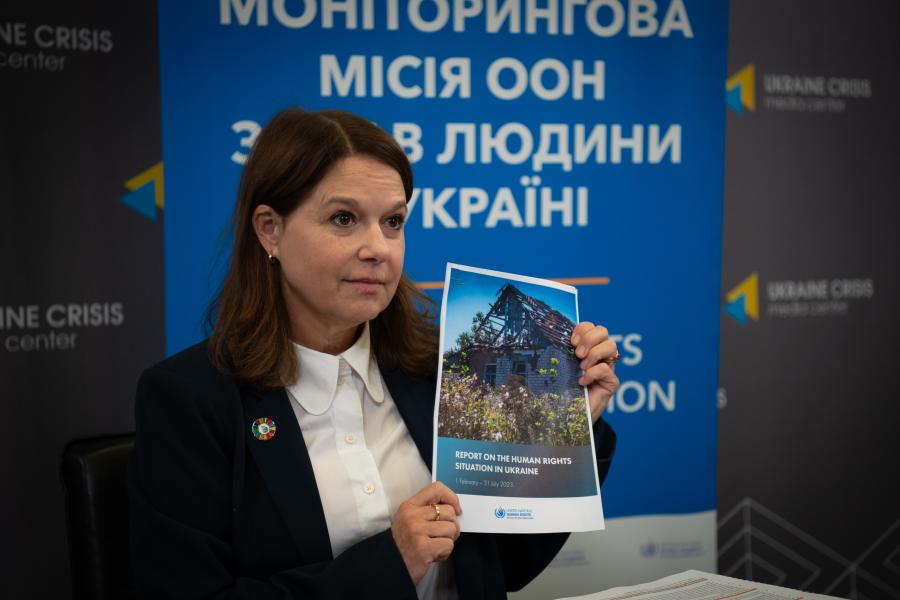ALMOST 20 MONTHS INTO RUSSIA’s ATTACK THE UN REPORTS A MOUNTING CIVILIAN TOLL AND RAMPANT HUMAN RIGHTS VIOLATIONS.
04 October 2023

KYIV 4 October 2023 – In a new report released today (Wednesday) the UN Human Rights Monitoring Mission in Ukraine (HRMMU) painted a bleak picture of the human rights situation in the country. With Russia’s invasion well into its 20th month, Ukraine’s civilians continue to pay a horrendous price with nearly 10,000 dead and tens of thousands injured, the report said, noting that over the past six months, the war has claimed, on average, six civilian lives a day. Missile attacks against residential areas and vital infrastructure, as well as grain and agricultural facilities, often located far from frontline areas, continue to sow fear and destruction across Ukraine. Civilians in areas occupied by Russia face torture, ill-treatment, sexual violence and arbitrary detention, Hundreds remain imprisoned, with their families unaware of their fate.
“The report’s findings show the war’s deadly toll on Ukraine’s civilians with almost six people dying and 20 suffering injuries on average every single day. In just six months covered by this report more than one thousand civilians died and nearly four thousand were injured.” said Danielle Bell who heads the UN’s human right monitoring mission in Ukraine.
The war has caused millions of Ukrainian civilians to fall below the poverty line. Their plight has been further exacerbated by broad economic and social harm caused by attacks on vital infrastructure and agricultural facilities. An example of this was the destruction of the Khakovka dam earlier this year that triggered major flooding and caused an environmental disaster that will have long-term adverse effects on the rights and well-being of the people living in the area.
“The war has wreaked havoc in the lives of millions of Ukrainians, including children who will have to live with horrific legacy of human loss, physical destruction, environmental damage, particularly contamination from explosive remnants of war, for many years to come,” said Bell.
The UN report said human rights monitors continued to document widespread torture and ill-treatment against civilians and POWs by Russian authorities, including severe beatings, electrocution, mock executions, sexual violence and degrading treatment. Appalling conditions of detention continued, including: lack of food and medical services; overcrowding; poor living conditions and sanitation; sleep deprivation; and no access to the outside world. Russia to date has refused to allow any access to the UN’s human rights monitors.
In contrast, the report notes that Ukraine continues to grant human rights monitors unfettered access to interned POWs and that conditions in Ukraine’s POW camp near the western city of Lviv have improved.
The report called for further investigation into the deadly attack on the penal colony of Olenivka in late July of 2022, which killed 51 Ukrainian prisoners of war and injured at least 139. But it ruled out that HIMARS rockets were used in the attack, noting that the available evidence is consistent with a projected ordnance having followed an east-to-west trajectory. The report faulted Russia for keeping prisoners of war in the proximity of the front line in violation of international humanitarian law and for not giving the UN access to the site.
In occupied areas, the report provided examples of Russia introducing its own administrative and education systems. Civilians in territory occupied by Russia were under pressure to accept Russian citizenship, with the occupying authorities making access to health care, pensions and other basic benefits dependent on the acceptance of Russian nationality. Male residents of the occupied areas faced intimidation, in an effort to coerce them to join the Russian armed forces, the report said.
While highlighting progress on some issues in areas controlled by Ukraine, the report noted the continued prosecution by Ukraine of thousands of individuals accused of collaboration with Russia in areas previously occupied by the Russian armed forces. The accused were often charged and convicted for conduct that could in principle be lawfully compelled by the occupying power under international humanitarian law, it said.
The report raised concern about the fate of Ukrainian children, some of them in institutional care with physical and intellectual disabilities, who were transferred from their regular places of residence to other locations within the areas occupied by Russia or deported to Russia. The report also mentioned cases of children who had been sent to summer camps in Russia with their parents’ purported consent but then were not returned home. The report notes that Russia to date has failed to identify the children and reunite them with their families and calls for the return of all deported and transferred individuals, including children and persons with disabilities.
ENDS
The report in English is available here.


